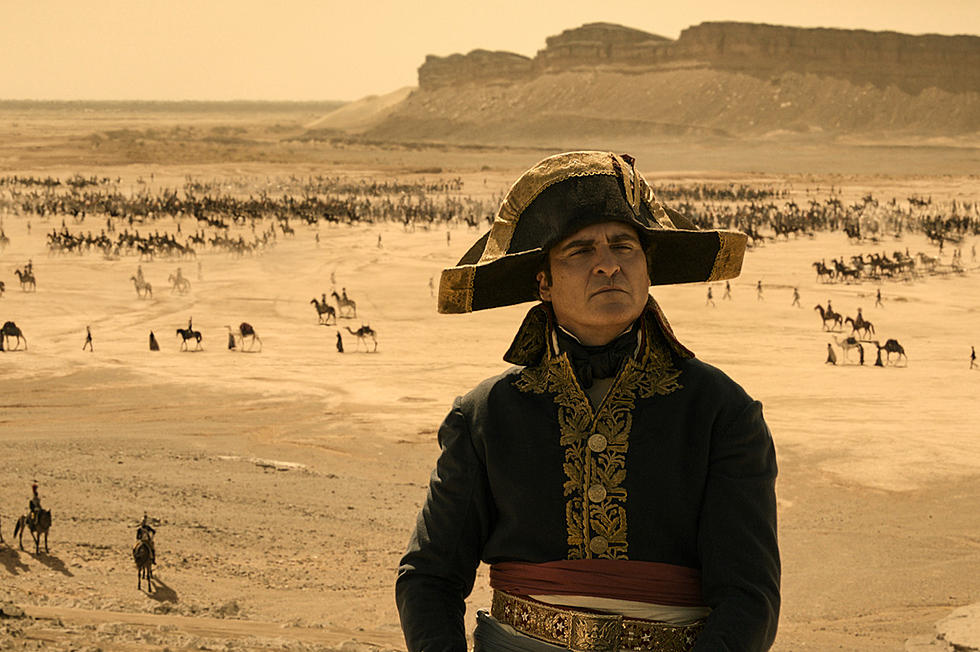
‘Napoleon’ Review: A Twisted Love Story Wrapped in a Plodding War Film
People are complicated creatures; they contain many contradictory impulses, emotions, and behaviors. Ridley Scott’s Napoleon aims to capture the contradictions of one such man by being a movie with almost as many different shades as the historical giant at its center. At times, Napoleon is a costume drama. For long stretches, it is a bloody war film. And occasionally — in its best moments — it becomes a sordid and twisted love story about the unbreakable bond between two people: Napoleon Bonaparte, played by Joaquin Phoenix, and his wife Joséphine, played by Vanessa Kirby.
Talk about complicated creatures. Napoleon first spies Joséphine across the room at a lavish party. It is the late 1790s, and Napoleon has recently been promoted to the rank of general after leading French forces in an inspired attack against the British Navy in Toulon. Joséphine is a widow; her first husband was recently executed during the last days of the Reign of Terror. While Napoleon is instantly smitten, Joséphine seems to regard him with curiosity and perhaps a little amusement; he is a short, haughty man in an elaborate uniform and signature bicorne hat and he will not stop staring at her. It is anything but love at first sight (at least not mutual love at first sight). Still, a marriage to a rising figure in the French military could have its advantages to a widow with children like Joséphine.
READ MORE: The Best Oscar Best Picture Winners in History
An awkward courtship and wedding soon follow, followed by years of fascinating tensions — romantic, sexual, and plain old you-are-pissing-me-off tension, most of it centered around the fact that as Napoleon ascends to the throne of France and becomes its emperor, he needs a male heir to cement his hold on power. Despite Napoleon’s endless attempts, Joséphine fails to provide him with one.
All of the power dynamics in the relationship flow from there. Napoleon (portrayed by Phoenix in an unusually un-showy performance) desires Joséphine (a gorgeous and enigmatic Kirby) but he needs her too, and the more she resists and teases and fails to get pregnant, the more it infuriates him and turns him on all at once. The pair get into enormous and sometimes hugely petty (and darkly hilarious) arguments. At the height of his frustration with Joséphine’s infertility, he launches into a manic monologue where he threatens her with divorce and proclaims his own greatness. Waving his dinner at his wife while explaining how destiny has chosen him for a great purpose, Napoleon shouts “Destiny has brought me this lamb chop!” an instantly iconic line sure to be quoted for years at restaurants that serve lamb.
Napoleon finds Ridley Scott returning to the setting of his very first feature film, 1977’s The Duellists, a historical drama which took place during the Napoleonic Wars. That earlier movie detailed the long rivalry between two French officers played by Harvey Keitel and Keith Carradine, who meet and fight over and over through the years. The two pictures are similar in some ways and different in others. For one thing, The Duellists’ entire budget was less than $1 million, which is probably more then Scott spent on just the lavish and ornately detailed period costumes in Napoleon. For another, the Napoleonic Wars in The Duellists were mostly the picturesque backdrop for an intense character story — while in Napoleon, the wars themselves constantly intrude on the more compelling elements of the story, namely the complex connection between the two central figures.
One thing that hasn’t changed about Scott’s depictions of the 19th century: He still doesn’t worry about filling 1815 France with French actors. Napoleon is one of those old-fashioned historical dramas where all of the characters are French and most of the actors are English and speak with English accents. Phoenix uses a slightly more mannered version of his normal speaking voice.
I don’t mind that; I would rather get lost in Phoenix’s brooding work without being distracted by zees and zeys and sacre bleu!s. As solid as Phoenix is, and as bleakly funny as his Napoleon is in moments when he rages against his imagined enemies or displays his staggering inadequacy as a lover, Kirby completely steals the movie from him with her statuesque poise and her pensive silences as she and Napoleon drift apart in the film’s final act.
Scott often treats his movies’ theatrical releases like lucrative test screenings for his eventual director’s cuts; no working filmmaker has reshaped more of their projects into longer (and sometimes radically different) works on home video than him. In the case of Napoleon, Scott has already said that he has a 4.5 hour cut in the works for an eventual release on Apple TV+. At times, this version of Napoleon, which runs a little over 2.5 hours, does play like an incomplete snapshot of a much larger work. Phoenix’s Napoleon arrives into the film as an ambitious young man, but already largely formed; no attention is paid to his childhood, his early years, or where his all-consuming hunger for power came from. Supporting characters drift in and out of his orbit; some are identified by title cards because otherwise the audience would have no idea who these people were or why they are important to the story. Scott never dwells for very long on any of them.
Instead, he spends a fair amount of time on the movie’s battle scenes, which are technically impressive and a bit interchangeable — thematically, if not visually. Certainly it would be very difficult to tell the story of Napoleon without exploring his supposed genius for military strategies and tactics. Scott does find striking ways to illuminate Napoleon’s battlefield prowess; his gift for improvisation and his use of the element of surprise. The film around Phoenix, though, feels far less light on its feet than its subject, especially in these sequences. They are present because they have to be, because inevitably at some point in a movie about this man, he’s going to have to point at the word “WATERLOO” scrawled on a giant map of Europe.
Unfortunately, they don’t really seem to add much to Napoleon beyond that. In fact, whenever Napoleon left Joséphine for yet another long and bloody campaign, I found myself longing for the movie to return to her and their relationship. If Ridley Scott meant for the film to do that in order to give you a glimpse into Napoleon’s own psyche, he succeeded all too well. I credit him with trying to encapsulate an enormous lifein a single, digestible movie, and for bring a lot of unexpected energy to the Napoleon/Joséphine scenes. But I also have to admit that I left the theater feeling like I would be less interested in watching Scott’s longer director’s cut than seeing a streamlined Napoleon that narrowed its focus entirely on the central marriage and its many ups and downs.
RATING: 6/10




